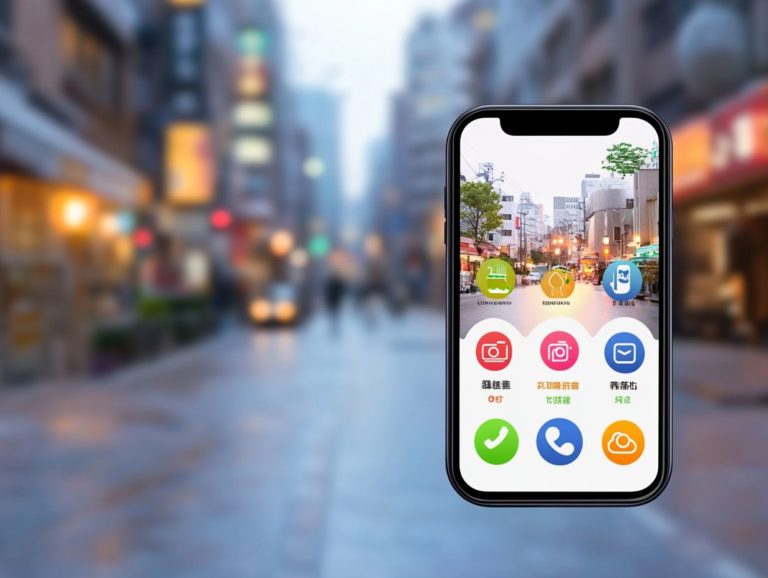Finding Work-Life Balance as an International Student
Navigating life as an international student can be both exhilarating and intimidating. As you immerse yourself in a new culture and confront academic challenges, maintaining a healthy work-life balance is crucial.
This guide highlights the unique obstacles you might face, from the effects of cultural shifts on your mental and physical well-being to the significance of establishing boundaries and employing effective ways to organize your time.
You’ll discover valuable resources designed to help you create and sustain that all-important balance throughout your journey. Join us as we unveil practical tips and insights tailored to enhance your experience abroad!
Contents
- Key Takeaways:
- The Challenges of Being an International Student
- Why Work-Life Balance is Important
- Top Tips for a Balanced Life
- Resources for International Students
- Creating a Sustainable Work-Life Balance
- Frequently Asked Questions
- What exactly is work-life balance?
- How can I achieve work-life balance as an international student?
- What are some signs that I may be struggling with work-life balance?
- How can I manage my time effectively to balance work and personal life?
- As an international student, what resources are available to help me find work-life balance?
- Is it possible to achieve work-life balance while studying and working as an international student?
Key Takeaways:

- Adjusting to a new culture can be challenging for international students, making it crucial to prioritize work-life balance to maintain mental and physical well-being.
- Work-life balance is essential for overall health and success, enabling international students to manage academic demands and social pressures effectively.
- Setting boundaries, prioritizing tasks, and using effective time management are key to achieving work-life balance. Seek support from campus and community resources to create a sustainable balance in the long term.
The Challenges of Being an International Student
Navigating the life of an international student presents many challenges that often blend cultural adjustments, academic pressures, and the intricacies of managing personal life. Learning how to handle academic pressure abroad is essential as you transition to a new study environment, especially in a place like Australia, where you juggle rigorous academic demands while fitting into diverse social circles.
The stress that accompanies these transitions can take a toll on mental health. It is essential to discover effective strategies that foster emotional support and maintain a healthy balance between your studies and personal well-being.
Adjusting to a New Culture
Adjusting to a new culture is one of the most significant hurdles you may encounter as an international student, directly impacting your ability to forge friendships and engage in social activities.
This transition often brings a whirlwind of emotions, ranging from excitement and curiosity to anxiety and homesickness. Language barriers can feel particularly daunting, making it challenging to connect with your peers.
However, embracing opportunities to participate in local events, join clubs, and attend workshops will help bridge those gaps and foster meaningful connections. By actively engaging in community initiatives and exploring cultural traditions, you enhance your social network and gain valuable insights into your new environment, enriching your overall experience.
Academic Demands and Social Pressures
The academic challenges faced by international students can feel overwhelming, demanding effective time management skills to balance work and study amid rigorous study commitments and social pressures.
With coursework that often delves into complex subjects and high-stakes exams, you may navigate a learning environment quite different from what you re used to. As you juggle assignments, group projects, and exam preparations, the added layer of cultural adjustments can amplify your stress.
Honing strong time management strategies is crucial not just for achieving academic success but also for ensuring you can engage in social interactions and participate in extracurricular activities. This approach fosters a well-rounded experience during your time studying abroad.
Why Work-Life Balance is Important
Maintaining a healthy work-life balance is essential for you as an international student. It significantly impacts your mental health and overall well-being, and knowing how to balance work and study abroad applications can give you the power to excel both academically and personally.
Prioritizing this balance enables you to manage the challenges of student life while nurturing your personal growth and happiness.
The Impact on Mental and Physical Health

The significance of work-life balance on mental and physical health is profound, particularly for international students who encounter a distinct set of stressors. Learning how to balance work and scholarships abroad can greatly help in managing these challenges.
You find yourself navigating academic demands, cultural adjustments, and sometimes, financial pressures. All of these can lead to burnout and anxiety.
For example, those marathon study sessions without proper breaks can take a toll on both your mind and body, resulting in headaches or fatigue.
Prioritizing self-care activities such as regular exercise, healthy eating, and adequate sleep becomes essential in alleviating these challenges.
Building connections with peers or seeking emotional support through counseling services can offer invaluable avenues for stress relief. This reinforces that a balanced life is not merely a lofty ideal but a crucial requirement for sustaining overall well-being.
Top Tips for a Balanced Life
Achieving a healthy work-life balance demands intentional strategies on your part. This includes managing your time well and establishing clear priorities, especially as an international student navigating the challenges of academic commitments alongside a part-time job. Learning how to balance study and social life overseas can be incredibly beneficial in this regard.
Setting Boundaries and Prioritizing Tasks
Setting boundaries and prioritizing tasks are essential strategies for you as an international student aiming to navigate student life in a foreign country while maintaining a harmonious work-life balance.
By establishing clear limits around your study hours and personal time, you can better navigate the competing demands of classes, assignments, and social obligations.
It s crucial to identify your most productive hours. This typically means scheduling the toughest tasks during those peak focus times while reserving your evenings for relaxation or social activities.
Try using planners or digital calendars to keep track of your tasks! This can greatly assist you in compartmentalizing your responsibilities, ensuring that you meet crucial deadlines without sacrificing essential downtime.
Incorporating regular self-care activities whether through mindfulness, exercise, or engaging in hobbies can significantly enhance both your academic performance and overall well-being.
Utilizing Time Management Strategies
Effective time management can improve your study environment, enabling you to excel in your academic pursuits as an international student.
By implementing a variety of techniques and tools tailored to your unique circumstances, you can not only meet deadlines but also cultivate a well-rounded lifestyle.
For example, setting specific goals and breaking tasks into manageable chunks can keep feelings of overwhelm at bay. Meanwhile, using digital planners or time-tracking apps can enhance accountability, ensuring that your study hours are both focused and productive.
Creating a dedicated study space, free from distractions, can significantly boost your concentration and efficiency, laying the groundwork for a successful academic journey abroad.
Resources for International Students
You have access to a wealth of resources tailored specifically for international students. This includes campus support services and community organizations dedicated to offering crucial emotional support as you navigate your adjustment period.
Campus Support Services

Campus support services play an essential role in your journey as an international student, providing workshops and emotional support specifically designed to address your unique challenges.
These services offer a comprehensive range of resources, from counseling services that tackle personal and cultural adjustment issues to academic workshops aimed at refining your study skills and boosting your academic performance.
Social engagement programs are particularly valuable. They cultivate a sense of community that helps you connect with peers and combat feelings of isolation.
By getting involved in these activities, you not only acquire important skills but also forge meaningful friendships, making your transition to a new environment much smoother.
Together, these diverse offerings create a nurturing atmosphere that supports both your academic success and emotional well-being.
Community Organizations and Networks
Community organizations and networking opportunities can profoundly enhance your social life as an international student, providing the tools you need to forge friendships and navigate the waves of cultural change.
These groups act as essential platforms for connection, bringing together students from varied backgrounds to share their unique experiences. By fostering interactions and creating an inclusive atmosphere, community organizations play a crucial role in alleviating the feelings of isolation that many newcomers often encounter.
Engaging in cultural events, workshops, and social gatherings allows you to build meaningful friendships and gain valuable insights into diverse customs and traditions. By participating in these organizations, you empower yourself to adapt more seamlessly to your new environment, promoting personal growth as you learn to navigate the complexities of life far from home.
Creating a Sustainable Work-Life Balance
Achieving a sustainable work-life balance is vital for your success as an international student! By effectively managing academic commitments, you can learn how to balance online classes and life abroad, prioritizing your mental health and personal life to ensure well-being and success in the long run.
Maintaining Balance in the Long-Term
To maintain balance in the long term, you must prioritize self-care and relaxation amidst your academic demands. Regularly carve out time for activities that recharge your spirit whether it’s diving into hobbies or taking leisurely walks in nature.
Establishing a routine that includes breaks can significantly help you manage stress, allowing for those essential moments of reflection and rejuvenation.
Incorporating relaxation techniques such as deep breathing, yoga, or meditation into your daily life can serve as effective tools for cultivating a peaceful mind.
By actively seeking out these restorative practices, you enhance your overall well-being and elevate your academic performance, ultimately paving the way for a more harmonious existence.
Frequently Asked Questions
What exactly is work-life balance?

Work-life balance refers to finding a healthy and sustainable balance between your work/study commitments and your personal life, including your physical and mental well-being, leisure activities, and relationships.
How can I achieve work-life balance as an international student?
It may be challenging, but some steps you can take to achieve work-life balance include setting priorities, managing your time effectively, seeking support, and establishing boundaries between work/study and personal life.
What are some signs that I may be struggling with work-life balance?
Some signs may include feeling overwhelmed, stressed, and exhausted constantly, neglecting self-care, having difficulty meeting deadlines, and experiencing strain in personal relationships.
How can I manage my time effectively to balance work and personal life?
Some helpful tips for managing time include creating a schedule, setting realistic goals, breaking tasks into manageable chunks, and learning to say no to avoid taking on too many commitments.
As an international student, what resources are available to help me find work-life balance?
Your university or college offers resources like counseling services, time-management workshops, and support groups. These can help you explore how to balance travel and academic responsibilities, ultimately contributing to a good work-life balance.
Don’t hesitate to reach out to friends, family, or fellow international students. They may be experiencing similar challenges and can offer valuable support.
Is it possible to achieve work-life balance while studying and working as an international student?
Absolutely, you can achieve a work-life balance! It might take some adjustments to find what works best for you, but with effective time-management and support, you can thrive as an international student. For tips on balancing work and study abroad, consider exploring available resources.






